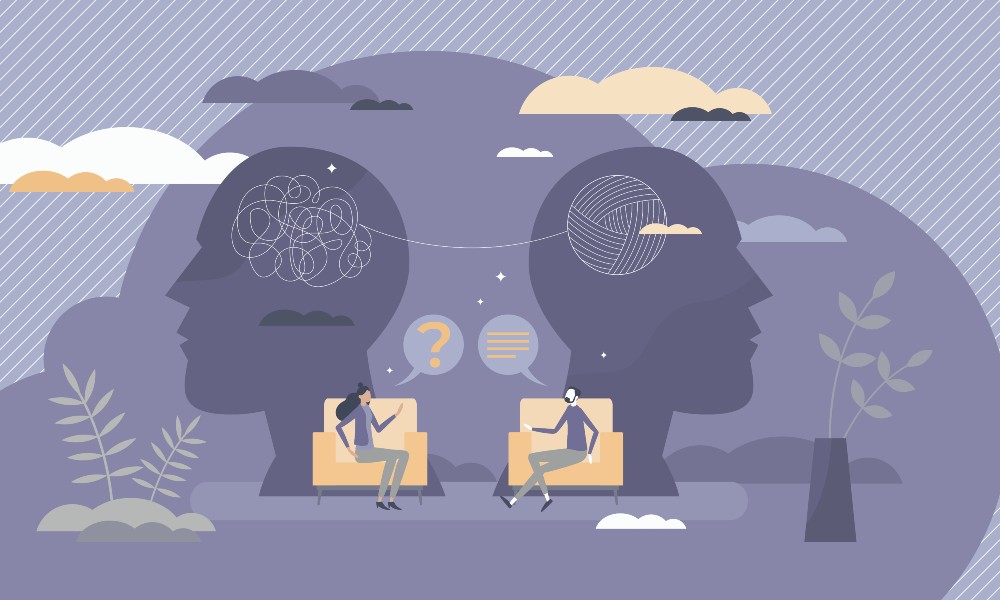Addiction is a complex disease that affects millions of people worldwide. It can take many forms, including alcoholism, drug addiction, and gambling addiction, among others. Addiction can have serious consequences on an individual’s life, including relationships, finances, health, and overall well-being. If you or a loved one is struggling with addiction, seeking the help of an addiction therapist can be a crucial first step toward recovery. Read this blog for further information on this type of therapist.
Contents
- 1 Who is an Addiction Therapist?
- 2 Why Do People Visit Addiction Therapists?
- 3 Treatments Used By Addiction Therapists Near Me
- 4 Sources To Find Addiction Therapist Near Me
- 5 Tips To Keep In Mind While Finding an Addiction Therapist Near Me
- 6 Pros of Visiting an Addiction Therapist Near Me
- 7 Cons of Visiting an Addiction Therapist Near Me
- 8 Conclusion
Who is an Addiction Therapist?

An addiction therapist is a mental health professional who specializes in treating addiction. They are trained to help individuals overcome addiction, develop coping skills, and manage triggers that may lead to relapse. Addiction therapists can work with individuals, couples, and families affected by addiction
Addiction is a chronic disease that can be challenging to overcome without professional help. Seeking the help of an addiction therapist can increase your chances of successful recovery. Addiction therapists can provide a safe and supportive environment where you can explore the underlying issues that may be contributing to your addiction. They can also teach you coping skills to manage triggers and prevent relapse.
Additionally, addiction therapists can provide support to your loved ones, who may be affected by your addiction. They can help your loved ones understand addiction, develop coping skills, and communicate effectively with you.
Why Do People Visit Addiction Therapists?
Addiction can be a complex and challenging issue to overcome. Seeking the help of an addiction therapist can be a crucial step toward recovery. Here are some reasons why you may want to visit an addiction therapist near you:
- You are struggling with addiction: If you are struggling with addiction, seeking the help of an addiction therapist can provide you with the support and tools you need to overcome it. An addiction therapist can help you understand the underlying issues that may be contributing to your addiction, develop coping skills, and manage triggers that may lead to relapse.
- You have tried to quit on your own but have been unsuccessful: Quitting an addiction can be challenging, and it’s common to experience relapses. If you have tried to quit on your own but have been unsuccessful, an addiction therapist can help you identify what went wrong and develop a plan for success.
- You are experiencing mental health issues: Addiction and mental health issues often go hand in hand. If you are experiencing mental health issues such as depression, anxiety, or trauma, seeking the help of an addiction therapist can be beneficial. They can help you understand the connection between addiction and mental health and provide you with the tools to manage both.
- Your relationships are being affected by addiction: Addiction can have a significant impact on your relationships with family, friends, and romantic partners. If your addiction is affecting your relationships, seeking the help of an addiction therapist can provide you with the tools to repair and strengthen them.
- You want to prevent relapse: Even after a successful recovery, the risk of relapse is always present. An addiction therapist can provide you with ongoing support and help you develop a relapse prevention plan to reduce the risk of relapse.
Treatments Used By Addiction Therapists Near Me

- Cognitive-behavioral therapy (CBT): CBT is a type of therapy that helps individuals identify negative thought patterns and behaviors that may be contributing to addiction. It helps individuals develop coping skills and strategies to manage triggers and prevent relapse.
- Dialectical behavior therapy (DBT): DBT is a type of therapy that combines elements of CBT with mindfulness practices. It helps individuals develop coping skills to manage intense emotions, improve interpersonal relationships, and reduce impulsive behaviors.
- Motivational interviewing: Motivational interviewing is a type of therapy that helps individuals overcome ambivalence about change. It helps individuals identify their reasons for change, develop a change plan, and build confidence in their ability to change.
- Group therapy: Group therapy provides individuals with a supportive environment where they can share their experiences and learn from others. Group therapy can help individuals develop social skills, improve interpersonal relationships, and reduce feelings of isolation.
- Medication-assisted treatment (MAT): MAT is a type of treatment that combines medication with therapy to help individuals overcome addiction. Medications, such as methadone or buprenorphine, can help reduce cravings and withdrawal symptoms, making it easier for individuals to focus on their recovery.
- Family therapy: Family therapy helps individuals and their families understand the impact of addiction on their relationships and develop strategies to repair and strengthen them.
- Holistic therapies: Holistic therapies, such as yoga, acupuncture, and meditation, can be used in combination with traditional therapies to help individuals manage stress, improve physical health, and promote overall well-being.
Sources To Find Addiction Therapist Near Me
- Online directories: Several online directories list addiction therapists by location. Some popular directories include Mantracare and Therapy Mantra.
- Referrals: You can ask your primary care physician or a trusted mental health professional for a referral to an addiction therapist.
- Insurance provider: If you have health insurance, your provider may have a directory of in-network addiction therapists.
- Support groups: Attend local support group meetings, such as Alcoholics Anonymous or Narcotics Anonymous, and ask for recommendations from other members.
- Internet searches: You can conduct a simple internet search for addiction therapists in your area. Be sure to check their qualifications and read reviews from previous clients.
- Local hospitals: Many hospitals have addiction treatment programs and may be able to provide referrals to addiction therapists in your area.
- Employee assistance programs (EAPs): If you have an EAP through your employer, they may be able to provide you with referrals to addiction therapists.
Tips To Keep In Mind While Finding an Addiction Therapist Near Me
- Qualifications and experience: It’s important to find an addiction therapist who is licensed and has experience treating addiction. You may also want to consider their treatment approach and whether it aligns with your needs and values.
- Location and availability: You will want to find an addiction therapist who is conveniently located and can accommodate your schedule. Consider whether you prefer in-person or virtual therapy sessions.
- Insurance coverage: If you have health insurance, check to see if the addiction therapist is in-network. If they are out-of-network, consider the out-of-pocket costs and whether you can afford them.
- Referrals and reviews: Ask for referrals from trusted sources, such as your primary care physician or a mental health professional. You can also read reviews from previous clients to get an idea of their experience with the addiction therapist.
- Communication style: It’s important to find an addiction therapist who you feel comfortable talking to and who listens to your concerns. Consider their communication style and whether you feel heard and understood.
- Treatment options: Consider the types of treatments offered by the addiction therapist and whether they align with your needs and preferences. Some addiction therapists may offer a combination of traditional and alternative therapies.
- Cost: It’s important to consider the cost of addiction therapy and whether it fits within your budget. Some addiction therapists may offer sliding scale fees or payment plans.
Pros of Visiting an Addiction Therapist Near Me

- Professional support: Addiction therapists are trained professionals who specialize in helping individuals overcome addiction. They provide a safe and supportive environment where individuals can explore the underlying issues that may be contributing to their addiction.
- Coping skills and relapse prevention: Addiction therapists can teach individuals coping skills to manage triggers and prevent relapse. They can help individuals develop a relapse prevention plan to reduce the risk of relapse.
- Family support: Addiction therapists can provide support to the loved ones of individuals struggling with addiction. They can help family members understand addiction, develop coping skills, and communicate effectively with their loved ones.
- Holistic approaches: Some addiction therapists may offer holistic approaches, such as mindfulness practices, yoga, or acupuncture, to help individuals manage stress, improve physical health, and promote overall well-being.
- Confidentiality: Addiction therapists are bound by ethical standards that require them to maintain the confidentiality of their clients. This can provide individuals with a safe space to discuss sensitive and personal issues without fear of judgment or consequences.
- Improved quality of life: Overcoming addiction can lead to significant improvements in an individual’s quality of life. Addiction therapists can provide the support and tools individuals need to lead fulfilling lives in recovery.
Cons of Visiting an Addiction Therapist Near Me
- Cost: Addiction therapy can be expensive, especially if the therapist is not covered by your insurance plan. Some addiction therapists may offer sliding scale fees or payment plans to make therapy more affordable.
- Time commitment: Addiction therapy often requires a significant time commitment, including attending regular therapy sessions and completing homework assignments. This can be challenging for individuals with busy schedules.
- Resistance to therapy: Some individuals may feel resistant to therapy and may not be open to the treatment process. It’s important to be honest with yourself about your readiness for therapy and to communicate openly with your therapist.
- Stigma: Despite the growing awareness of addiction as a disease, there is still a stigma surrounding addiction and seeking help for it. Some individuals may feel embarrassed or ashamed about their addiction and may be hesitant to seek help.
- Relapse: Recovery from addiction is often a long and challenging process, and relapse can occur. While addiction therapy can provide individuals with the tools to manage triggers and prevent relapse, it’s important to recognize that relapse is a common part of the recovery process.
Conclusion
Addiction is a complex disease that can have serious consequences on an individual’s life. Seeking the help of an addiction therapist can be a crucial first step toward recovery. If you or a loved one is struggling with addiction, there are several resources available to help you find an addiction therapist near you. When looking for an addiction therapist, consider their experience, treatment approach, availability, and location. With the right support, you can overcome addiction and lead a fulfilling life in recovery.
For more information, please contact MantraCare. Online therapists are increasingly important in today’s world because they provide a convenient and accessible way for people to receive mental health support and treatment. Visit MantraCare If you are searching for a “therapist near me”. Book a trial Online therapy session


